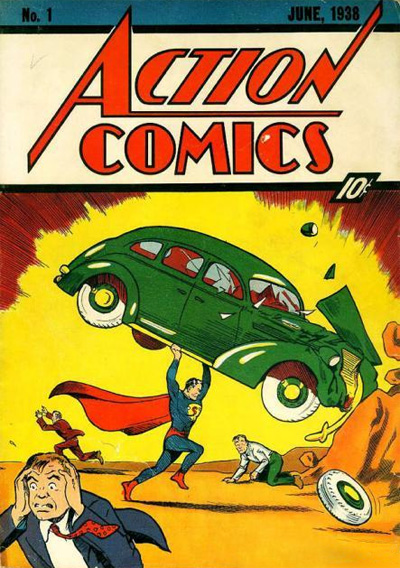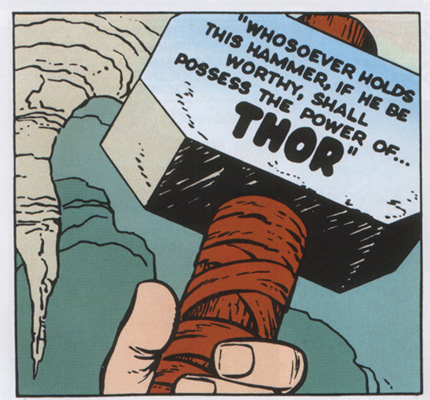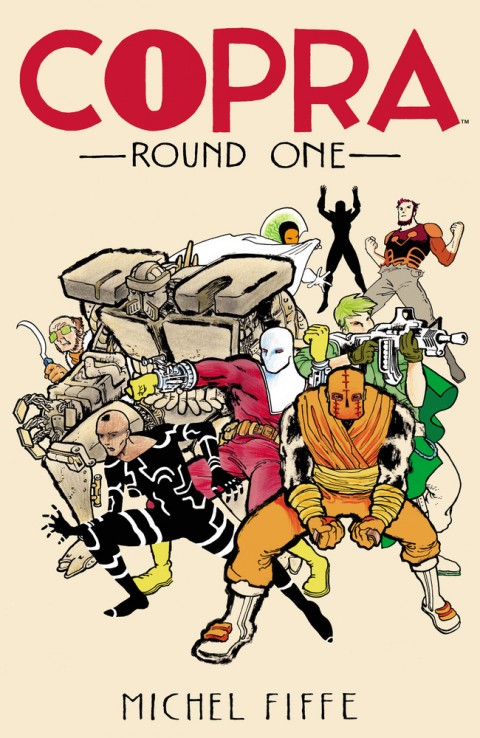I found this column very hard to write. For while I agree that creators should be well compensated for their work, I also feel that the large companies do a lot of work in promoting and marketing characters as well. This isn’t about dumping on the little guy, nor is it about going on a diatribe against big comic. I wanted to talk about a system which seems imperfect for everyone.
It is pretty easy when looking at series like Preacher, Ex Machina, Bone, Groo, and the like. These are new universes and the creators should keep all rights. The publishing companies make money in the same way that fiction novel publishing companies work. It is clear cut, but when we are dealing with already established universes like the Marvel or DC U it is much trickier to untangle the messy issue of creator rights.
Very few people would disagree that guys like Joe Simon, Jack Kirby, Joe Shuster, and the early giants were not really adequately compensated for creating seminal works of the superhero genre. But really these guys are the outliers. Creating Superman is different than creating Manchester Black or the Rocket Racer. These creators built the universes we read and love.
But what about those who have come after and get to play in the large Marvel or DC sandbox? Do they deserve more financial compensation for creating new heroes or villains? Or do they deserve further rights for re-imagining a classic character?
Let’s take Frank Miller for example. He didn’t create Batman or Daredevil but he arguably redefined both characters. Should he now get extra compensation for the fact that basically every Batman movie since 1989 owes him a debt? And where does the compensation stop? If in 2077 there is a new Batman reboot that is based on Batman: Year One should the estate of Frank Miller get more money?
The opposite to this is when a character is quite different at creation. A good example is Deadpool: Rob Liefield created the character but it can be safely argued that he did not refine Deadpool into the cash cow he is today. So who should get more compensation Rob Liefield or guys like Joe Kelly and Ed McGuinness?
And what about characters that are largely derivative of pre-existing characters? Does Bob Kane deserve something for Moon Knight?
Perhaps the real issue is adequate compensation for services at the outset. Let’s say that an artist or writer makes $2000 per issue and creates a new superhero in a four issue mini-series (I am totally making these numbers up, so if anyone has any insight please comment). So they get $8000, seems like a lot, eh? But what if Hollywood makes a movie of the character and that movie grosses $300 million? Doesn’t it seem that the creators should get more than their “fair” compensation for work for hire? The issue is one of degree. Yes the big companies marketed the character, they put resources behind ensuring it was a household name, but without that original idea all that comes after it would be moot.
Further to this do inkers, colourists, and letterers deserve compensation for the success of a character? Comic books are a collaborative medium and while the original idea might start out with a writer or artist there are many others who contribute to the success of a book.
It is a very difficult issue to unravel.
It seems that the fairest method of compensation would be that a creator gets a proper salary for work. Then they should get a percentage of collected issue sales, and a percentage of toys, movies, and lunchboxes. If the movie is based on a specific story then that creative team should get a percentage. Of gross. None of that net b.s. thank you very much Hollywood accounting. But the percentage should be based on how much of the idea is used. So if it is just the character itself, and not much else, then a terribly small percentage should be given. A lot of people were responsible for the success of The Dark Knight, but Bob Kane wasn’t one of them. However, if the movie or video game or whatever is mostly taken from some other work (like 300 for example) then the creator should get a bigger piece of the pie.
Not every character will be a hit. And not every series will sell thousands of copies of trade paperbacks. But some will. And when this happens creators should get something. If coming up with new comic book characters were easy everyone would do it. But marketing and promoting a new character isn’t easy either. Without Big Comic some of these great ideas would just be ideas in the notebook of a 13 year old boy. Publishing comic books is an expensive endeavour and creativity needs a place to grow; companies provide that place. It is a symbiotic relationship that should work for everyone. There is enough money to go around.
Although if I ever end up writing Spider-Man for Marvel I completely take back everything I said. I want some of that friendly neighbourhood spider-cash!
Note: Big thanks goes out to Music Video Director Evan Winter for a very serious debate on the topic. Check out his website here.





As an online fanzine, I understand why CBD is starry eyed about creators but you have to understand that these are just people. If commercial artists should be compensated for their success, then shouldn’t we all?
It comes down to what’s spelled out in the contract. If you sign away your rights to an idea, then your idea has been sold and it no longer belongs to you. I think it’s unfair for the originator to come back years later, after the fact and ask for more money.
However, if you’re Michael Jordon or Leonardo DeCaprio and you’re able to fill those seats… you have the ability to ask for a new contract that’s more appropriate which many creatives do these days. But dispute the incredible popularity of guys like Joe Madureira… he’s unable to parlay his Battle Chasers into anything meaningful (but craft is not an idea so one can argue that Battle Chasers, while amazingly crafted, was never really a great idea). Good luck to him on Avenging Spidey…
Success is often a result of chemistry. If guys like Jack Kirby and Joe Simon… or any of us could be successful on our own,… we probably would be.
Chico, there is probably no better (or is it worse?) example of this problem than Spider-Man, who is not only owned by the largest publisher, but whose origin is rather more complicated than the non-comics world realizes. (I mean “origin” in this sense of “first conception as a fictional character in 1962”, not the AF#15 storyline depicting how Peter Parker got his powers).
Now, every interested in comics, and even many who aren’t, knows Stan Lee. He is one creator whose work is owned by a corporation, yet he has obviously been compensated for his work…and uniquely so, for someone of his era — although even he has sued for what he felt had been denied him!
Many comics fans will also know of the (somewhat unilateral) feud between Lee and Steve Ditko about who created (or co-created) Spider-Man. (I’m pretty much just going to ignore the supposed / alleged / purported contributions of Simon and Kirby to the very earliest developments of the idea that led to Spider-Man…mainly because I don’t feel like typing forever).
Lee is often credited as the sole creator of Spidey, but has acknowledged the immense contributions of the guy who designed the iconic costume and plotted the character’s earliest stories. Even when complimenting Ditko’s role, however, Lee argues that the term “creator” really best applies to the person who first conceives the main idea and elements of a character’s personality. (See Lee’s interview in the BBC’s “In Search of Steve Ditko” documentary from a couple years back).
While Lee’s position is essentially correct — for there could’ve been no red-and-blue web costume without the IDEA of a fellow with spider powers — his position is just that: essentially correct…NOT “entirely correct”.
In the super-hero genre of comics, the art is arguably as important as the words; some would say it’s far more so. Ditko’s position on the matter? Basically that, decades on, Marvel doesn’t advertise its ever-growing mountain of Spider-Man merchandise with a paragraph explaining Stan Lee’s “ideas”, describing the character’s powers, origin, behaviour, (etc.). Instead, he says, Marvel just shows you a visual: the costume or mask that he, Steve Ditko, created.
Had Lee taken to writing novels or short prose stories about a teenager with spider-powers, without Ditko’s accompanying visuals, would “Stan Lee’s creation” even be discussed some 50 years later? Would it be the focal character of an industry leader’s product line, and the subject of billions of dollars of merchandise in countless media? Maybe…after all, characters far inferior to Spider-Man (I’m thinking of Harry Potter) have begun in novels and gone on to spawn millions and even billions of dollars in films, toys, spin-offs, etc.
But it’s telling that every variant of the Spider-Man costume, from the alien costume, to 2099, to that idiotic blue sweater Scarlet Spider — every one — recalls Ditko’s design in some fashion. Those trademark Spidey eyes, like the “S” on Superman’s chest and the ears of Batman’s cowl, might be worth as much, creatively, as any words written about those characters.
^ Oh, and I forgot to mention, if there’s any doubt about the enormity of Steve Ditko’s role as “co-creator”, just consider this: before he got involved in the concept, “Spiderman” dressed like Captain America and got his powers from a magic ring…or something.
‘Nuff said, as they say.